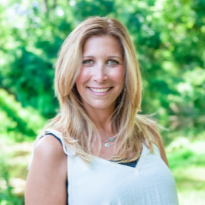
Do you feel like everything in your life – including your mind – is filled to the brim when you’re getting divorced? Even the most organized people can battle with staying on top of everything during this kind of life event, and it can easily become overwhelming. You might be constantly thinking you can never be organized, or you’re at a point where it feels impossible to get organized.
Getting divorced offers you the perfect opportunity to declutter your life. “It’s not just about moving out,” Jessica herself has learned. “It’s about really figuring out how you see yourself moving forward and what goes along with that.” Laurie Palau from Simply B Organized understands the struggle people go through when getting a divorce and started her business to help others who don’t’ know where to start.
Laurie joined T.H. and Jessica on the Divorce etc… podcast to discuss not the tactical side of organization, but the strategy behind it.
The Three Types of Clutter
There are three types of clutter Laurie addresses. One: the physical clutter, the clutter we can see — the toys, the dishes, the laundry. Two: emotional clutter, which is similar to the sentimental stockpiling T.H. does. This type of clutter usually stems from guilt or fear: maybe you feel guilty because it was a gift, or because it was expensive, or because your kid made it for you. Three is what Laurie calls “calendar clutter” — when you overschedule yourself because you’re trying to be everywhere at the same time to appease everyone else in your life.
Jessica understands this on a deeper level. As an overscheduler herself, she gets the challenges of staying organized when constantly overbooking. “The calendar clutter almost feeds into the emotional part of it because it adds to the overwhelm,” Jessica explains. “It can be paralyzing.”
“At certain times, it was almost comforting to see my calendar full,” T.H. says, recognizing how different her reactions were to Jessica’s when she would do the same thing (overschedule). “It gives you a false sense of security and being productive.” It’s not a great coping mechanism, but T.H. knows that doesn’t necessarily stop her.
These are two great examples of how the calendar clutter can lead into the emotional side of things. Laurie sees this behavior with any divorcee she’s working with, man or woman.
“You’re going above and beyond, either because of habit or guilt, to do things for your kids, or this, that, and the other, that you have to overcompensate for your lousy ex or whatever. And so you’re adding unnecessary tasks onto your calendar, which is just burdening and slowing you down.”
What’s Your Clutter Category?
Laurie explains that she finds most people heavily resonate with one of the areas of clutter more than others, whether it’s physical, emotional or calendar-based. This self-awareness is great to be able to finally start to give yourself some clarity and to understand where you’re struggling most.
The process of tackling your clutter struggles can be helped immensely by having someone like Laurie to lean on. If you go through the process of trying to deal with it all yourself, you’ll find yourself getting in your own head, feeling frustrated, and feeling alone. Laurie’s there to help be a sounding board for those frustrations, encourage you to take the process step-by-step, and cut you some slack where you may feel like you don’t deserve it. As Laurie reminds us, “It’s easy for it to become overwhelming very quickly.”
So What Can I Keep?
Laurie does believe there’s a place for keepsakes and memorabilia. You can keep things that hold special meanings for you, but it’s all about doing it with intention. Making sure you’re holding onto things for the right reasons instead of holding onto everything is important. “When you hold onto everything, it dilutes it,” explains Laurie.
The whole purpose of organizing for Laurie is for the ease of finding what she needs when she needs it. “It’s less about the act of putting it away,” she says. “How quickly can I get it?” Shifting your mindset from the actual organization of your things to how easily you’ll be able to access them once organized can alter your way of decluttering.
How to Start
First, ask yourself: “What area of my life is the biggest pain point right now?”
This could be a physical space, a routine, or whatever makes you unhappy. Many times, Laurie has people coming to her because it’s a physical space that they’ve found to be their biggest pain point, and they’re preparing to move, whether it’s because the house is tied to memories, certain rooms are tied to emotions, or areas feel overwhelming.
When addressing this question, your first instinct, like most, might be to try to get rid of the pain point as soon as possible. This is where you need to differentiate the busy from the productive. What do you actually need to do right now? What’s important for you right now?
Laurie has a four-pile method where she empties a space for a client and sorts it into four piles: your keep pile; your relocation pile, where you may want to keep certain things but just move them to a new space; your donation pile, where you’re giving things away to give them a new life; and your recycle pile, things you want to fully remove from your life.
The Five Main Clutter Pitfalls
This method isn’t without its fair share of roadblocks. Laurie has identified five main clutter pitfalls that people fall into when trying to sort their belongings. The first pitfall is procrastination. We are all guilty of this – when something feels overwhelming, we try to put it off for later. Even sticking all of the clutter into one area, a method you may feel is decluttering from other areas, is a method of procrastination for the inevitable.
The second is indecision. This one typically stems from fear, the feeling that you don’t know what to do so that you won’t do anything. If you’ve gone through any level of trauma, you’re going to be doubting your decisions heavily, especially if your former relationship was with someone who constantly gaslit you or made you feel incapable in any way.
The third is guilt, which goes hand in hand with many of these other pitfalls. You may feel guilt when decluttering things that may hold sentimental value to other people. “When you’re deciding what you’re keeping and what you’re getting rid of,” says Laurie, “both should be done with a level of intention.” So if you’re the one leaving and packing up, packing up things with intention is vital. If you’re getting rid of things, figuring out where it goes and who it could go to needs to be done with intention as well.
The fourth, the “overwhelm,” can overpower you, making you feel like there’s no way to even begin the decluttering process. The fifth pitfall, which again, overlaps with many of these, is time. How are we using our time? Are we making sure we have time set aside to do the work? Many people will talk about the process, read about it, and gather all the information needed to start it, but never execute the plan.
How to Overcome Your Roadblocks
The key to getting past your roadblocks is to focus on boundaries, whether physical or emotional. Whether it’s only restricting what you keep from a room to what can fit in a box, or how you block off moments in your day, boundaries are key in making sure you aren’t overwhelming yourself in the process and giving yourself some flexibility when it comes to your organization process.
Wherever you are in the process of decluttering, be kind to yourself. It’s a difficult process, and it’s not going to come easy. There is no quick fix for reorganizing your life, especially after a divorce. Having a friend, or someone like Laurie, or even Laurie’s book on organization – having any kind of resource in the process can help you immensely and remind you that it’s okay to find the process difficult and that you aren’t alone in it.
Leave a Comment
You must be logged in to post a comment.










